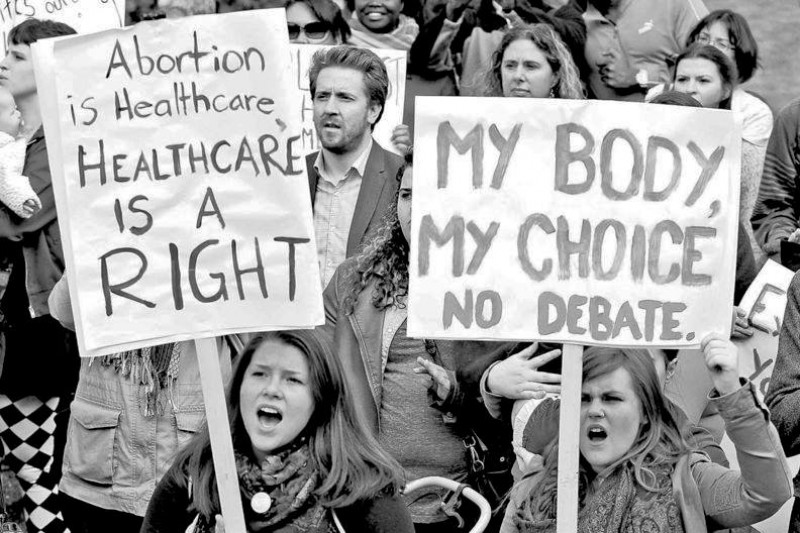Why Healthcare For Women is so Important
June 6, 2019
With new abortion laws cemented in Southern states, controversies and issues concerning women’s healthcare have risen again.
In mid-May, the state of Alabama created a law that is to ban abortion. Voted on by a pool of primarily white men and passed by Republican Governor Kay Ivey, citizens of this country are pushing everything aside to have this debate on human rights’.
Pro-choice is the belief that women should have a choice on abortion and have the safety and accessibility to do so, pro-life states abortion should cease to exist. Similarly to most cases, there are extremes on either end but a large chunk of citizens believe in regulations rather than bans. Some of these regulations include not allowing abortions beyond the first trimester or not allowing abortions unless it is a case of incest, rape, or could be a potential threat to the mother’s life.
With these suggested regulations comes the argument: should we be regulating women’s bodies’ and why? With any sort of regulation or ban on abortion, it is important to recognize that banning abortion will never stop abortion, banning legal and safety regulated abortion will only create more room for unsafe, at home abortions. By “regulating” someone’s body, that party is having their rights’ infringed upon.
Those who claim to be “pro-life” are in many cases the same people that are anti-gun legislation. Many pro-lifers believe all life is equal until that life consists of the LGBTQ community, people of color, poor people, and those who are disabled. These hypocritical contradictions lead to unequal opportunity after the child is born. The person that does not like or agree with abortions should ignore them, just like they do with children stuck in poor living conditions or in foster care. Like they ignore living humans in need, that can survive outside of a uterus, unlike an embryo.
It is also noteworthy that sex education is just now becoming a topic that can be comfortably discussed. Regulations that state women can only get abortions in their first trimester can only help women that are aware that they are pregnant. For some on birth control or naturally, it is common for women to miss menstrual cycles. If that is a medical norm, what is the indication that a woman is pregnant? Birth control can also become ineffective if one takes an antibiotic. Lacking this knowledge that society has failed to educate hundreds of thousands of women on, it is unfair to take their right’s of abortion away.
This ban is a fundamental human rights’ issue. Healthcare should not be a topic of debate especially when religion or personal beliefs are used as a “substantial” argument. Not only is a religion not an applicable argument to those that do not have a belief system, but in the Catholic religion, birth control is frowned upon.
The traditional ideas of not using contraceptives or maintaining abstinence until marriage are factors that heighten the possibility of an unwanted pregnancy. Being taught these ideas primarily during one’s teen years is dangerous because this absence of education is not letting girls as young as sixteen years of age live their own lives and is instead forcing children to raise children. Since the government would not let a teenager adopt a child, why should a teen have kept the child?
The argument of “What if that baby you abort would have grown up to cure cancer or help the world?” Well, what if the mother would have grown up to cure cancer but now she is unable to get the proper education to do so because she has a child? It does not matter if she was raped or just had a slip-up, that girl should not be forced to bear that burden if she is not ready or willing to take on the responsibility.
Older women out of their teen years can suffer from this abortion ban because although it is possible for any woman to struggle during pregnancy, older women are typically more susceptible to birth complications. With this ban put in place, even when a threat to the life of the mother she would not be able to get an abortion.
Another disturbing fact is that this ban will also not allow abortions in instances of incest or rape. In fact, women can face more time in jail for aborting the unwanted embryo than the man who raped her. Even the doctor that performed the procedure will get more jail time than the person that committed the crime.
President Donald J. Trump is, of course, no supporter of women’s’ healthcare or reproductive right’s but even commented on his stance in an infamous Twitter post. “As most people know, and for those who would like to know, I am strongly Pro-Life, with the three exceptions – Rape, Incest and protecting the Life of the mother – the same position taken by Ronald Reagan.” President Trump has succeeded in appointing two conservative justices to the Supreme Court, the place where ultimately the landmark ruling in Roe vs. Wade could be overturned if any of the states’ cases are challenged and eventually reach that court. Whether his two appointees – Justices Neil Gorsuch and Brett Kavanaugh – will stand behind Roe vs. Wade is up for speculation.
The alternatives are performing an unsafe at home abortion or crossing state borders to be able to safely abort the baby. Again, there is a common issue of accessibility in women’s healthcare. This ban will cause more deaths for living people or the means taken to get a safe abortion in another state are too expensive and not accessible.
When a woman becomes impregnated she is viewed as irresponsible and is blamed for her unwanted pregnancy. Despite the fact that it takes two to create a child, the man will never be the one at fault. The girl that falls pregnant is shamed by society and expected to raise a child while the father is given a free pass, as males are often given free passes in our society.
So instead of regulating women’s’ bodies’ and banning their healthcare why don’t we start with men? Vasectomies are reversible so why should unwanted pregnancy be the fault of only the woman? The truth is, if men could get pregnant there would probably be abortion and birth control ATM’s everywhere. She has to take birth control, she must abstain from sex, but if he says he doesn’t want to wear a condom, she has the sexual and societal pressure to comply with his habits to then be the one shamed by his decision.
Thus far, five states have passed the “Heartbeat Bill”, this bill stating when a heartbeat is detected, a woman can no longer abort the baby. These states are Louisiana, Missouri, Alabama, Georgia, and Ohio. Politicians are even striving to overturn Roe V. Wade, bringing America back to a time where women began their most intense battle, a battle that is still going on today.
While other states are making it more and more difficult for women to obtain abortions, it is unlikely that New Jersey will be impacted. However, rights being taken away from women in the South should be a wake-up call to all women, and men for that matter.






